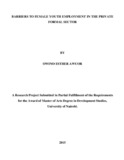| dc.contributor.author | Owino, Esther Awuor | |
| dc.date.accessioned | 2016-04-22T07:19:34Z | |
| dc.date.available | 2016-04-22T07:19:34Z | |
| dc.date.issued | 2015 | |
| dc.identifier.uri | http://hdl.handle.net/11295/94791 | |
| dc.description.abstract | Female youths in Kenya account for the majority of the unemployed youths compared to their male
counterparts and are mainly engaged in the informal sector, which is precarious in nature. Access to
formal employment characterized by stable working conditions has remained a major challenge to
majority of young women in Kenya. Despite this fact, existing literature does not highlight the possible
barriers that hinder young women from accessing formal job opportunities. It is against this background
that this study sought to investigate the barriers to female youth employment in Kenya’s private formal
sector, which is a major creator of formal jobs in Kenya. The study’s specific objectives were as follows:
(i) to examine the characteristics of the targeted female youths in Kawangware and East Kanyada
locations. (ii) to analyze how the characteristics of the female youths constrain them from accessing
formal employment in Kenya’s private sector. (iii) to examine how labour market institutions restrict
female youths from accessing formal employment in Kenya’s private sector.
The study employed both qualitative and quantitative research techniques in order to address its
objectives adequately. Quantitative data was collected using a survey while qualitative data was
collected using key informant interviews. The findings revealed that the respondents had limited human
capital skills in terms of training and work experience which hindered them from being competitive in the
formal labour market. In addition, the existing institutions in the private sector organizations where the
respondents weredrawn from were also found to be limiting female youths’ access to formalemployment.
The study therefore recommends that the government should adopt more measures to promote post
secondary schooling for female youths in technical/science fields as well as arts and humanities and to
collaborate with the private sector in order to create programs aimed at enhancing access to labour
market information as well as adopting flexible working conditions for female employees | en_US |
| dc.language.iso | en | en_US |
| dc.publisher | University of Nairobi | en_US |
| dc.subject | Barriers, female youth employment, private sector | en_US |
| dc.title | Barriers to Female Youth Employment in the Private Formal Sector | en_US |
| dc.type | Thesis | en_US |

